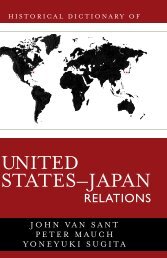New History Textbook (Chapter 4 & 5) 2005 version - Bakumatsu Films
New History Textbook (Chapter 4 & 5) 2005 version - Bakumatsu Films
New History Textbook (Chapter 4 & 5) 2005 version - Bakumatsu Films
You also want an ePaper? Increase the reach of your titles
YUMPU automatically turns print PDFs into web optimized ePapers that Google loves.
What It Means To Study <strong>History</strong><br />
The <strong>History</strong> Our Ancestors Lived<br />
Most people may believe that the reason for studying history is to learn what happened in the past,<br />
but that is not necessarily correct. A more accurate definition of history as a discipline is learning<br />
how people of the past lived in the context of the events of the past — what they believed, what<br />
caused them pain, and how they overcame difficulties.<br />
The history you are about to study is the history of Japan. In other words, you will be familiarizing<br />
yourselves with the stories of your ancestors — your blood relatives. Your closest ancestors are<br />
your parents, who were preceded by your four grandparents. As you go back further in time, the<br />
number of ancestors increases with each generation. Then you realize that the humans who<br />
populated the Japanese Archipelago are ancestors you share with the other students in your<br />
classroom. In every era, Japanese history was made by ancestors common to all of us.<br />
Traditions of the Japanese Civilization<br />
Every nation in the world has a unique history; Japan is no exception. From time immemorial, our<br />
land has been the wellspring of civilization and unique traditions. In ancient times, the Japanese<br />
studied and appreciated the civilization that arose in China, but they never lost sight of their own<br />
traditions. Over the centuries, they built an independent nation. To see our ancestors’<br />
accomplishments, you need only visit important cultural and historical sites.<br />
In the modern era, the U.S. and Western European nations threatened to engulf East Asia.<br />
But Japan sought harmony with Western civilization — a harmony that could be achieved while<br />
retaining Japanese traditions. As Japan transformed itself into a modern nation, it made every<br />
effort to maintain independence. But those were difficult times, and tension and friction arose<br />
between Japan and other nations. We must be grateful to our ancestors for their unceasing efforts,<br />
which made Japan a wealthy and safe nation (the safest in the world, in fact).<br />
Identifying with Out Ancestors<br />
The most important aspects of studying history are to become knowledgeable about the problems<br />
our ancestors faced throughout history, and to imagine what you might have done in their place.<br />
Then you will see that historical facts are not simply disconnected events to be memorized. You<br />
will awaken to people’s hopes and inspirations, and the connection between one event and others.<br />
The more you delve into history, the more likely you are to make unexpected discoveries and to<br />
develop the ability to see events from different perspectives.<br />
When you study history, you are holding a conversation with people of the past — a conversation<br />
that looks to the future.<br />
1













